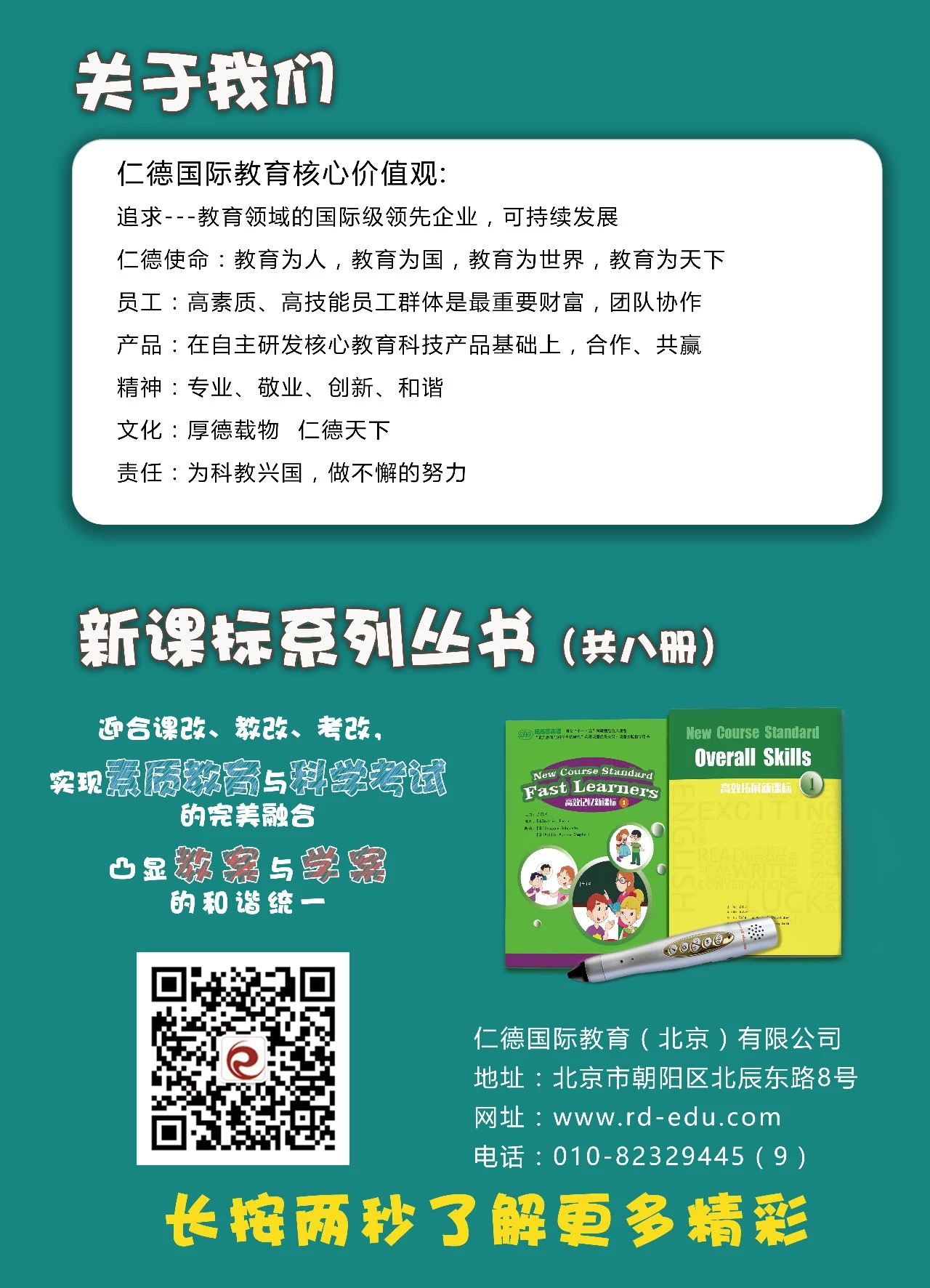如(rú)何讓孩子養成學英語的(de)好習(xí)慣?(另附小(xiǎo)學英語知識彙總)
作者: 來源:本站 發表時間:2020-6-3 13:27:17 浏覽:次
家長們可(kě)以陪同孩子養成這些學英語的(de)好習(xí)慣,并且一直堅持下去,小(xiǎo)英相(xiàng)信孩子的(de)英語一定會(huì)有(yǒu)大(dà)提升
1、日常生活中随時随地(dì)練習(xí)
1. 将英語真正融入日常生活。不要學英語,而要生活在英語當中。
2. 把難單詞、難句子制(zhì)成卡片。放(fàng)到(dào)自己可(kě)以接觸到(dào)的(de)地(dì)方,幫助自己随時記憶。
3. 睜開(kāi)眼睛的(de)第一件(jiàn)事就是“大(dà)聲喊英語”。喊出一天的(de)活力和(hé)輝煌。喊出一天的(de)充實和(hé)成功。
4. 平時說英語、練英語的(de)時候一定要元音(yīn)特别飽滿。這樣可(kě)以訓練自己的(de)非凡氣質。
5. 看到(dào)的(de)、聽到(dào)的(de),都(dōu)嘗試翻譯成英文(wén)。随時随地(dì)訓練自己的(de)“口譯能(néng)力”。
6. 随時随地(dì)攜帶單詞本。收集好單詞、好句子、好文(wén)章(zhāng)。尤其是名言警句。
7. 乘公交或者地(dì)鐵(tiě)的(de)時候可(kě)以将卡片拿出來閱讀(dú)。這是最有(yǒu)效的(de)學習(xí)方法。
2、有(yǒu)計(jì)劃地(dì)刻意練習(xí)
8. “四個(gè)一”原則:每當讀(dú)英語或說英語的(de)時候,都(dōu)做到(dào)一擡頭、一挺胸、一收小(xiǎo)腹、一用(yòng)力。這樣,我的(de)英語馬上(shàng)就會(huì)變得地(dì)道、好聽。
9. 有(yǒu)空就練習(xí)輔音(yīn)。要想說一口流利的(de)英語,就必須做到(dào):元音(yīn)飽滿悅耳、輔音(yīn)準确清晰。經常咬下嘴唇,苦練[v]這個(gè)音(yīn),誇張地(dì)朗讀(dú)drive,vegetable,five等單詞。
10. 盡量多地(dì)聽錄音(yīn)。這是最有(yǒu)效、最便宜的(de)學習(xí)方法。聽得越多,語感就越好。而且你(nǐ)的(de)英語發音(yīn)就越好聽。
11. “每天有(yǒu)計(jì)劃的(de)訓練自己的(de)“翻譯能(néng)力”。學習(xí)英語的(de)最高(gāo)目标就是:中英文(wén)自由轉換。這也(yě)是社會(huì)最需要的(de)能(néng)力,當然這也(yě)是爲你(nǐ)自己創造最大(dà)價值的(de)能(néng)力。這個(gè)能(néng)力很難獲得,一定要每天堅持練習(xí)。先準确翻譯單詞,然後是句子,其次是短文(wén)。
12. 收集好文(wén)章(zhāng)。将所有(yǒu)讓自己心動的(de)文(wén)章(zhāng)反複朗讀(dú),最好能(néng)脫口而出。因爲隻有(yǒu)背誦課文(wén)才是征服英語的(de)最終解決之路(lù)。
13. 要養成一種偉大(dà)的(de)習(xí)慣:善于利用(yòng)一天當中大(dà)量的(de)被忽略的(de)、被浪費的(de)一分(fēn)鍾、兩分(fēn)鍾。你(nǐ)一旦有(yǒu)了這個(gè)偉大(dà)的(de)習(xí)慣,你(nǐ)的(de)一天将是别人(rén)的(de)兩天,甚至三天。
14. 要養成随身攜帶英語書(shū)的(de)習(xí)慣。在窗邊、廚房、客廳,甚至廁所都(dōu)放(fàng)了英語書(shū),快速看上(shàng)一兩分(fēn)鍾就足夠了。什(shén)麽都(dōu)怕天天做,什(shén)麽都(dōu)怕堅持。
15. 要養成熱(rè)愛丢臉的(de)習(xí)慣。管它說好說壞,隻管瘋狂地(dì)說。隻有(yǒu)這樣才會(huì)越說越好。You must enjoy losing face!
16. 忘掉謙虛。賣弄得越多,記憶得越牢。
17. 瘋狂收集和(hé)掌握成語。英語的(de)一個(gè)難點就是習(xí)慣用(yòng)語,也(yě)可(kě)以稱爲習(xí)語。現在就送你(nǐ)一個(gè):get on one’snerves,意思是“讓某人(rén)很煩”。請脫口而出這個(gè)句子:That noise get son my nerves。(那噪音(yīn)讓我心煩。)
18. 第一句不能(néng)脫口而出,堅決不學第二句。這又(yòu)是一個(gè)偉大(dà)的(de)習(xí)慣。剛開(kāi)始的(de)時候,進度可(kě)能(néng)比較慢(màn),但(dàn)一定要堅持,因爲這樣做會(huì)爲自己打下堅實的(de)基礎。
19. 把每天堅持朗讀(dú)英語當成訓練自己意志力的(de)一個(gè)辦法。這種訓練一舉兩得:既讓自己變得更有(yǒu)意志,而且順便講了一口流利的(de)英語。
20. 每天都(dōu)贊揚自己的(de)記憶力。自己的(de)語言模仿能(néng)力,自己的(de)天賦。不要給自己的(de)負面思想留下任何空間。從今天開(kāi)始養成這個(gè)習(xí)慣。
21. 永遠記住:重複就是力量。我們學不好英語的(de)原因就是重複得遠遠不夠。爲了訓練自己的(de)英語功力和(hé)耐心,請你(nǐ)每個(gè)月(yuè)都(dōu)做這樣一件(jiàn)事情:把一篇文(wén)章(zhāng)每天朗讀(dú)三次,每次三遍,連續一個(gè)月(yuè)。奇迹一定會(huì)發生。你(nǐ)的(de)發音(yīn)、語感,你(nǐ)的(de)記憶力、理(lǐ)解力都(dōu)會(huì)得到(dào)提升。
附 小(xiǎo)學英語必備語法知識點
1現在進行(xíng)時
表示正在發生的(de)事情或進行(xíng)的(de)動作,常與now,listen,look等詞連用(yòng),結構是主語+be動詞(am, is, are)+動詞ing.
如(rú):It is raining now.
外面正在下雨
It is six o’clock now.
現在6點了
My parents are reading newspapers in the sitting room.
我父母正在客廳看報紙(zhǐ)
Look! The children are having a running race now.
看!孩子們正在賽跑
問句将be動詞移前,否定句在be動詞後+not.
表示經常反複發生的(de)事情或動作,常與often, usually, sometimes, always, every day(week year…) on Sundays等詞連用(yòng)。
結構是主語+動詞原形;當主語爲第三人(rén)稱單數即he,she, it, Tom, my mother, the boy等詞時,動詞後加s或es.
如(rú):We have an English lesson every day.
我們每天都(dōu)要上(shàng)英語課
Do the boys run faster than the girls? Yes, they do.
男孩比女(nǚ)孩跑的(de)快嗎?是的(de)
問句借助于do, does否定句借助于don’t, doesn’t,後面動詞一定要還原。
表示發生在過去的(de)事情或存在的(de)狀态,常與just now; a moment ago; … ago; yesterday; last ( week; month; year; Monday; weekend); this morning等詞連用(yòng)。
結構是主語+be動詞的(de)過去式(was; were)或主語+動詞的(de)過去式。
注意:be動詞與動詞過去式不可(kě)同時使用(yòng)。
如(rú):My earphones were on the ground just now.
我的(de)耳機剛剛還在呢。
Where were you last week? I was at a camp.
你(nǐ)上(shàng)個(gè)星期去哪了?我去野營了
What did you do yesterday? I visited a farm
你(nǐ)昨天去幹嘛了?我去參觀農(nóng)場(chǎng)了。
問句有(yǒu)be動詞将be動詞移前,沒有(yǒu)be動詞借助于did,後面動詞還原;
否定句有(yǒu)be動詞在後面加not,沒有(yǒu)借助于didn't後面動詞還原。
表示将要打算發生的(de)事情或動作,常與tomorrow, next week(year; Tuesday…), this week( weekend ;evening; afternoon;…)today等詞連用(yòng)。結構是主語+be(am, is, are) going to + 動原或主語+will +動原。
如(rú):What are you going to do tomorrow? I am going to have a picnic.
你(nǐ)明(míng)天要去幹嘛?我要去野餐。
The childre are going to have a sports meeting next week.
孩子們下個(gè)星期将參加運動會(huì)。
Tom will/is going to see a play with his father this evening.
Tom今晚将和(hé)父母去看演出。
問句将be動詞或will移前;否定句在be動詞或will後加not.
can; can’t; should; shouldn’t; must; may後一定加動詞原形。
如(rú):The girl can’t swim, but she can skate.
女(nǚ)孩不會(huì)遊泳,但(dàn)是會(huì)滑冰
Don’t talk in class, you should listen to the teacher carefully.
不要再課上(shàng)說話(huà),你(nǐ)應該認真聽老師(shī)講。
肯定祈使句以動詞原形開(kāi)頭;否定祈使句以don’t加動詞原形開(kāi)頭。
如(rú):Open the box for me ,please.
請爲我打開(kāi)盒子。
Liu Tao! Please get up earlier tomorrow.
劉濤,明(míng)天請早點起床!
Don’t walk on the grass!
不要在草(cǎo)地(dì)上(shàng)走!
Helen! Don’t climb the tree,please.
海(hǎi)倫!不要爬樹。
去幹嘛用(yòng)go +動詞ing
如(rú): go swimming; go fishing;
go skating;
go camping;
go running;
go skiing;
go rowing…
than 前用(yòng)比較級;as…as之間用(yòng)原級。
如(rú):My mother is two years younger than my father.
我媽(mā)比我爸(bà)年輕兩歲。
Liu Tao jumps as far as Ben.
劉濤跳得和(hé)本一樣遠。
用(yòng)like +動詞ing或like+ to + 動原。
如(rú):Su Yang likes growing flowers.
蘇陽喜歡種花。
The children like to play with lanterns at Spring Festival.
孩子們喜歡在春節去玩花燈。
用(yòng) would like +to+動原或want + to +動原。
例:I’d like to visit the History Museum.=I want to visit the History Museum
用(yòng)于肯定句中,在否定句和(hé)問句中改爲any,但(dàn)當表示委婉語氣時仍用(yòng)
如(rú):Can I have some writing paper? Would you like some orange juice?
人(rén)稱代詞主格做主語用(yòng)一般放(fàng)在句首或動詞前,主格分(fēn)别是 I you he she it we you they。
賓格做賓語用(yòng),一般放(fàng)在動詞或介詞後
如(rú):Open them for me. Let us …, join me等。
賓格分(fēn)别是me you him her it us you them。
形容詞性物(wù)主代詞放(fàng)在名詞前,不能(néng)單獨使用(yòng),分(fēn)别是my your his her its our your their
名詞性物(wù)主代詞相(xiàng)當于形物(wù)加名詞,它隻能(néng)單獨使用(yòng)後面不好加名詞,分(fēn)别是mine yours his hers its ours yours theirs。
介詞後要麽不加動詞,加動詞隻能(néng)加動詞ing形式
如(rú):be good at running;
do well in jumping;
季節前,月(yuè)份前用(yòng)介詞in
如(rú):in summer;in March
具體的(de)哪一天如(rú)星期幾,幾月(yuè)幾日用(yòng)介詞on
如(rú):on Saturday; on the second of April; on Wednesday morning
在幾點鍾前用(yòng)介詞at
如(rú):at a quarter to four;
隻在上(shàng)下午晚上(shàng)用(yòng)in
如(rú):in the morning/ afternoon/ evening;
但(dàn)在夜間用(yòng)at night。
另:季節,月(yuè)份和(hé)星期前不好加the.
有(yǒu)規則的(de)有(yǒu):
(1)直接在名詞後加s
如(rú)orange—oranges; photo—photos;
(2) 以x, s, sh, ch 結尾的(de)加es
如(rú):box—boxes; glass—glasses; waitress—waitresses; watch—watches;peach--peaches
(3) 以輔音(yīn)字母加y結尾的(de)改y爲i加es
如(rú):study—studies;library—libraries; hobby—hobbies; family—families;
(4)以f, fe結尾的(de)改f, fe 爲v+es如(rú):knife—knives; thief—thieves(注:以o結尾的(de)我們學過的(de)隻有(yǒu)mango加es, mango—mangoes其餘加s,)
不規則的(de)有(yǒu):
man—men; woman—women; people—people; child—children
(1)直接在動詞後加s
如(rú):run—runs; dance—dances
(2)以s,sh,ch,o結尾的(de)加es
如(rú):do—does;go—goes;wash—washes;catch—catches
(3)以輔音(yīn)字母加y結尾的(de)改y爲i加es
如(rú):study—studies; carry—carries;
(1)直接在動詞後加ing
如(rú):sing—singing; ski—skiing;
(2)雙寫詞尾加ing
如(rú):swim—swimming; jog—jogging;run—running;
(3)以不發音(yīn)的(de)e結尾的(de)去e加ing
如(rú):ride—riding; dance—dancing; make—making;
(1)直接在動詞後加ed
如(rú):clean—cleaned; milk—milked; play—played;
(2)以e結尾的(de)直接加d
如(rú):dance—danced; taste—tasted;
(3) 以輔音(yīn)字母加y結尾的(de)改y爲i加ed
如(rú):study—studied;carry—carried;
(4)雙寫詞尾加ed
如(rú):stop—stopped; jog—jogged;
不規則的(de)有(yǒu):am,is—was; are—were; do,does—did; have,has—had; go—went; meet—met; sit—sat; see—saw; get—got; tell—told; run—ran; come—came; steal—stole; read—read;
規則的(de):
(1)直接在形容詞或副詞後加er
如(rú);small—smaller; low—lower;
(2)以e結尾的(de)加r
如(rú):late—larer;
(3)雙寫詞尾加er
如(rú):big—bigger; thin—thinner; fat—fatter;
(4) 以輔音(yīn)字母加y結尾的(de)改y爲i加er
如(rú):heavy—heavier; early—earlier;
不規則的(de)有(yǒu):
good, well—better(最高(gāo)級爲best); many, much--- more(最高(gāo)級爲most); far---farther;
(1)作爲名詞意思是雨水(shuǐ)和(hé)雪(xuě)是不可(kě)數名詞
如(rú):There is a lot of rain there in spring. 那兒的(de)春天有(yǒu)很多雨水(shuǐ)。
(2) 作爲動詞意思是下雨和(hé)下雪(xuě),有(yǒu)四種形式分(fēn)别是:
動詞原形rain, snow;
第三人(rén)稱單數rains ,snows;
現在分(fēn)詞raining;snowing
過去式rained;snowed;
如(rú):①Look! It is raining now. 瞧!天正在下雨。
②It often rains in Nantong in summer.南通夏天經常下雨。
③ It rained yesterday.昨天下了雨。
④It is going to rain tomorrow. 明(míng)天要下雨。
(3)形容詞爲rainy 和(hé)snowy 意思是有(yǒu)雨的(de)和(hé)有(yǒu)雪(xuě)的(de)
如(rú):It is often rainy here in spring.這兒的(de)春天經常是有(yǒu)雨的(de)。
If it is rainy tomorrow, I’ll stay at home.如(rú)果明(míng)天是有(yǒu)雨的(de),我将呆在家裏。
注意隻有(yǒu)同類事物(wù)才可(kě)進行(xíng)比較。
如(rú):My eyes are bigger than hers.Your school bag is heavier than mine. My computer is nicer than Nancy’s. My brother is stronger than me.
表示某人(rén)有(yǒu)(has用(yòng)于第三人(rén)稱單數);There is/ are;
There was/ were 表示某地(dì)存在有(yǒu)
注意There be 句型的(de)就近原則
單數或不可(kě)數用(yòng)there is /was;
複數用(yòng)there are/ were.
眼鏡glasses; 耳機earphones; 鞋shoes;褲子trousers等詞本身是複數。
如(rú):My glasses were on the chair just now.
但(dàn)如(rú)果表示這雙,這副,一雙的(de)時候用(yòng)單數
如(rú):There is a pair of chopsticks on the plate. This pair of earphones is for you.
a用(yòng)于輔音(yīn)前不是輔音(yīn)字母前;an 用(yòng)于元音(yīn)前不是元音(yīn)字母前。
如(rú):There is an ’s’, a ‘t’, a ‘u’, a ‘d’ ,an ‘e’, an ‘n’,and a ‘t’ in the word ‘student’.
有(yǒu)兩種:
(1)直接讀(dú)時鍾和(hé)分(fēn)鍾。
如(rú)6:10讀(dú)成 six ten; 7:30讀(dú)成seven thirty; 8:45讀(dú)成eight forty-five;
(2)用(yòng)to與past表示。
在半小(xiǎo)時包括半小(xiǎo)時以内用(yòng)幾分(fēn)past幾點
如(rú):6:10讀(dú)成ten past six; 7:30讀(dú)成half past seven;
過了半小(xiǎo)時用(yòng)下一個(gè)鍾點差幾分(fēn)
如(rú)7:45讀(dú)成a quarter to eight; 9:50讀(dú)成ten to ten;
基變序有(yǒu)規律,結尾加上(shàng)th; 一二三特殊例,結尾字母t、d(即first, second, third);
八去t, 九去e, ve要用(yòng)f替(即eigh—eighth; nine—ninth; five-- fifth ;twelve—twelfth);
ty改y爲ie後加th别忘記(即整十數如(rú)twenty—twentieth;forty—fortieth);
幾十幾十位爲基個(gè)位爲序(如(rú)第二十一爲twenty-first)。
另外強調序數詞前一定要加the。
用(yòng)the+序數詞+ of +月(yuè)
如(rú):三月(yuè)三日 the third of March;
12月(yuè)25日 the 25th of December.
如(rú):My parents are both teachers.
all表示三者以上(shàng)都(dōu)
如(rú):The students are all very excited.
有(yǒu)day的(de)節日前用(yòng)on.
沒有(yǒu)day的(de)節日前用(yòng)at,
如(rú):at Christmas; on Christmas Day; at New Year; on New Year’s Day.
excited表示激動的(de),興奮地(dì)主語是人(rén);
exciting表示令人(rén)激動的(de),令人(rén)興奮的(de)主語是事情
如(rú):The running race is very exciting, so all the students are very excited.
賽跑非常令人(rén)激動,因此所有(yǒu)的(de)學生都(dōu)很激動。
兩者比較用(yòng)比較級,三者以上(shàng)比較用(yòng)最高(gāo)級
如(rú):Who runs faster, the boy or the girl? The boy does
誰跑得更快,男孩還是女(nǚ)孩?男孩。
Which season do you like best? I like autumn best.
你(nǐ)最喜歡哪個(gè)季節?我最喜歡秋天。
Which season do you like better, summer or winter? I like winter better.
你(nǐ)更喜歡哪個(gè)季節,夏天還是冬天?我更喜歡冬天。
前面用(yòng)了do, does did, don’t, doesn’t didn’t後面動詞要還原。
如(rú):Did she watch TV last night?
Helen doesn’t like taking photos.
到(dào)達用(yòng)get to
但(dàn)注意到(dào)家,到(dào)這兒,到(dào)那兒不可(kě)以加to
如(rú):get home; get here; get there,
另外go home; come here; go there也(yě)一樣。
長著(zhe)什(shén)麽用(yòng)with
如(rú):the girl with big eyes 大(dà)眼睛的(de)女(nǚ)孩;
穿著(zhe)什(shén)麽用(yòng)in
如(rú):the man in black穿黑(hēi)衣服的(de)男人(rén)
或:the woman in the white skirt 穿白色短裙的(de)婦女(nǚ)
用(yòng)let sb後加動詞原形
如(rú):Let’s water the flowers together.
是該做…的(de)時候了用(yòng)It’s time for+名詞或It’s time to +動原。
幫助某人(rén)做某事是help sb with sth
如(rú):幫我學英語是 help me with my English
外來的(de)東西(xī)在樹上(shàng)用(yòng)in the tree
如(rú):the bird in the tree;
樹上(shàng)長的(de)用(yòng)on the tree
如(rú):the apples on the tree
球類之前不加the;
樂(yuè)器(qì)之前必須加the
如(rú):play the piano; play football
如(rú):get stronger; get longer


